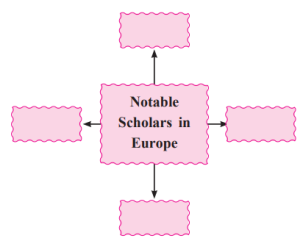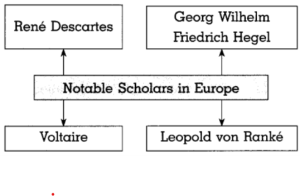Historiography : Development in the West
Question 1. (A) Choose the correct option from the given options and complete the statement.
(1) It may be said that …….. was the founder of modern historiography.
(a) Voltaire
(b) Rene Descartes
(c) Leopold Ranke
(d) Karl Marx
Answer:
(a) Voltaire
(2) ………… wrote the book entitled ‘Archaeology of Knowledge’.
(a) Karl Marx
(b) Michel Foucault
(c) Lucien Febvre
(d) Voltaire
Answer:
(b) Michel Foucault
(B) Identify and write the wrong pair in the following set
(1) Georg Wilhelm Friedrich Hegel – ‘Reason in History’
(2) Leopold von Ranké – ‘The theory and Practice of History’
(3) Herodotus – ‘The Histories’
(4) Karl Marx – ‘Discourse on the Method’
Answer:
(1) Right pair: Georg Wilhelm Friedrich Hegel – ‘Reason in History’
(2) Right pair: Leopold von Ranké – ‘The theory and Practice of History’
(3) Right pair: Herodotus – ‘The Histories’
(4) Wrong pair: Karl Marx – Discourse on the Method.
2. Write short notes.
(1) Dialectics
Answer:
- In order to understand the true nature of an event, one needs to know its opposite for e.g. True – False, Good – Bad, etc.
- A German philosopher, Georg Wilhelm Friedrich Hegel had put forward this method of analysis of history.
- A theory called ‘Thesis’ is proposed at the beginning. It is followed by another theory called Antithesis’ which is, contrary to ‘Thesis’.
- After a thorough logical discussion of both new thesis is proposed having gist of both (Thesis and Antithesis).
- This process of orriving at a new thesis is called Synthesis.
- This method of analysis of history which is based on opposites is known as ‘Dialectics’.
(2) Annales School
Answer:
- At the dawn of the twentieth century, the writing ¿f history got a new direction.
- Along with political events, kings, great leaders, the study of climate, local people, agriculture, trade, technology, means of communication, social divisions and their collective psychology of a group was also considered important in the study of history.
- This new school of thought is known as Annales School. Annales School was started by French historians.
Question 3. Explain the following with its reason.
(1) Historical research was driven to focus in depth on various aspects of women’s life.
Answer:
- Initially, there was a lot of dominance of male perspective on historical writing. Simone de Beauvoir, a French scholar, insisted on inclusion of women perspective in historiography.
- She emphasised on the inclusion of women in the process of writing history.
- She insisted on rethinking of the male dominated perspective of history.
- Because of her efforts historical research was driven to focus in depth on various aspects of women’s lives their employment, their role in trade unions, institution working for their cause, and their family life.
(2) Foucault called his method, ‘the archaeology of knowledge’.
Answer:
- According to Michel Foucault, the prevailing method of arranging historical events in a chronological order was not right.
- He threw light on the fact that archaeology does not strive to reach the ultimate historical truth.
- It attempts to explain various transitions in the past.
- Foucault gave more importance for explaining the transitions in history. Hence, his method is called ‘the archaeology of knowledge’.
Question 4. Complete the concept chart.
Answer :
Question 5. Answer the following in detail.
(1) Explain Karl Marx’s ‘Class Theory’.
Answer:
In the latter part of nineteenth century, German thinker, Karl Marx put forward ‘Class Theory’ in his book ‘Das Kapital’. According to him:
- History i not about abstract ideas but living people. The fullillment of basic needs of people depends on the nature of prevalent means of production and the ownership.
- All the different strata of the society do not get equal access to these means of production which causes the division of the society into classes. It rešults into class struggle.
- The class which owns means of production $ economically exploits the rest of the classes. Human history, according to him, is the history of class struggle.
(2) What are the four characteristics of modern historiography?
Answer:
The following are the four characteristics of modern historiography:
- Its method is based on scientific principles and begins with formation of relevant questions.
- These questions are anthropocentric i.e. they are about ancient human societies and their deeds in that period of time. No interrelation between the divine and human needs is suggested.
- Answers to these questions are supported by reliable evidence and they are presented in a logical order.
- History presents a graph of man’s progress with the help of his deeds in the past.
(3) What is feminist historiography?
Answer:
- Feminist historiography means writing history with women perspective. There was a lot of dominance of male perspective on historical writing.
- Simone de Beauvoir, a French scholar, insisted on rethinking on the male dominated perspective and including the women’s perspective in historiography.
- The idea of feminist historiography was accepted.
- Because of her efforts various aspects of women’s lives like their employment, their role in trade unions and their family life became part of historiography.
(4) Explain Leopold von Ranké’s perspective of history? Answer: Leopold’s view on ways to write history throws light on his perspective of history:
- He spoke about the critical method of historical research. He gave importance to information gathered through original documents.
- He also stated that all types of original documents related to the historical event should be examined in detail and with great care.
- He believed that with this method it was possible to reach the historical truth. He was critical of imagination in narration of history.



Leave a Reply